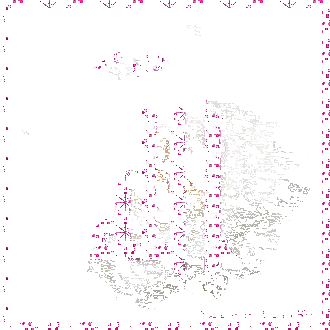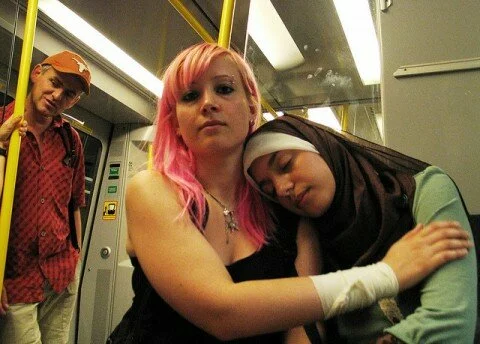
VTB Group and Gazprombank are vying to become the first Russian borrowers to sell Islamic debt in a bid to attract Middle Eastern investment.
VTB, Russia’s second-largest bank, aims this year to raise about $200 million selling sukuk, debt that complies with Islam’s ban on interest, Herbert Moos, the lender’s deputy chairman, said in an interview Wednesday. Gazprombank, the lending arm of gas export monopoly Gazprom, is in talks with at least 10 Moscow-based companies on arranging a sale and will meet investors in the Persian Gulf in September, said Alexander Kazakov, director of structured and syndicated finance.
“We’ll probably see an issue in dollars, ranging from $100 million to $200 million” by the end of the year, Kazakov said in an interview this week. “We’ve been talking to Russian companies from various sectors, including metals, food, oil and gas.”
The banks join borrowers in neighboring Kazakhstan as well as Thailand and Senegal in seeking to tap the $4.9 billion global sukuk market, which is predominantly centered in the Middle East and Malaysia. Yields about 6 percent would lure demand, Sarah Al-Suhaimi, who helps manage more than $2 billion of assets, at Riyadh, Saudi Arabia-based Jadwa Investment, said in an interview this week. Average sukuk yields are at about 4.2 percent, according to the HSBC/NASDAQ Dubai U.S. Dollar Sukuk Index.
The yield on VTB’s dollar bonds due in 2015 dropped one basis point to 4.54 percent Wednesday and has declined 80 basis points so far this year, touching a record-low 4.36 percent on April 6. The lender has $17.4 billion of total debt.
Gazprombank’s 2015 dollar bonds yielded 4.81 percent Wednesday, down 94 basis points in the year. The Moscow-based bank has $4.3 billion in debt.
Sukuk sales from outside Asia and the Gulf Cooperation Council region, which includes Bahrain and Saudi Arabia, will help develop the industry, Rafael Dalmau, head of sharia-compliant portfolio management at BNP Paribas Investment Partners in Singapore, said by e-mail April 26.
“Having new issuance from countries outside the GCC and Asia is extremely beneficial to the further development of the global sukuk market,” Dalmau said. “There is an imbalance in the supply-demand equation, with the market looking for more investment-grade issues and more geographical diversification.”
Russia is rated BBB by Standard & Poor’s, its second-lowest investment grade, while Malaysia is ranked two notches higher at A-. Moody’s Investors Service ranks Russia at Baa1, the third lowest investment-grade rating.
Global sales of sukuk have climbed 20 percent this year from $4.1 billion in the same period of 2010. Issuance from the six-member GCC dropped to $964 million from $2.3 billion a year ago.
In Malaysia, the largest sukuk market, offerings of Islamic bonds climbed to 10.9 billion ringgit ($3.7 billion) this year from 5.7 billion ringgit in the same period in 2010.
Shariah-compliant bonds returned 4 percent this year, according to the HSBC/NASDAQ Dubai U.S. Dollar Sukuk Index, while debt in developing markets gained 1.7 percent, JPMorgan Chase‘s EMBI Global Diversified Index shows.
The difference between the average yield for sukuk and the London Interbank Offer Rate, or Libor, narrowed three basis points to 238 on Wednesday, while average yields dropped two basis points to 4.22 percent, according to the HSBC/NASDAQ Dubai U.S. Dollar Sukuk Index.
The extra yield investors demand to hold the Dubai Department of Finance’s 2014 bonds rather than Malaysia’s sukuk due in 2015 fell three basis points to 241.
The Bloomberg-AIBIM-Bursa Malaysia Sovereign Shariah Index, which tracks the most traded ringgit-denominated bonds, climbed to 102.06 on April 26 and is up 1 percent this year.
Scholars argue that fatwas, or laws that deem whether Islamic products are sharia-compliant, differ around the world and a Russian sukuk would have to be vetted to ensure compliance for investors in the Middle East, said Jadwa Investment’s Al-Suhaimi.
While yields of about 6 percent on the Russian bank sukuk would be attractive, “the structure used would also have to be accepted by our sharia scholars because most of the structures used by Malaysian issuers are not accepted by our scholars,” Al-Suhaimi said.
Russia set up a five-member Islamic economics department in January, Rushan Abbyasov, head of administration at the Russia Muftis Council, or board of scholars, said in an interview in Jakarta on April 1. The country doesn’t have any laws restricting sukuk issuance, he said during a 10-day visit to study sharia-compliant banking operations and meet religious leaders in Indonesia, the world’s biggest Muslim nation.
At least two or three companies have talked with Russia’s Islamic scholars to discuss the possibility of structuring sukuk, Abbyasov said. He declined to provide names.
The agency has also translated and published four standards from the Bahrain-based Accounting & Auditing Organization for Islamic Financial Institutions, he said. That organization, which has more than 200 members, sets standards that are used in Bahrain, the Dubai International Financial Center, Jordan, Lebanon, Qatar, Sudan and Syria, according to its web site.
“There’s strong interest in Islamic finance in Russia,” Abbyasov said. “We’ve also conducted workshops to increase awareness.”
Al Sharms Capital, a Moscow-based investment company, established the first sharia-compliant private equity fund focused on the Commonwealth of Independent States in June last year, according to a statement on its web site. Kazakhstan, a predominantly Muslim former Soviet republic to the south of Russia, may sell $500 million of Islamic bonds, Deputy Finance Minister Berik Sholpankulov said in March, Interfax reported.
Russian banks are diversifying sources of funding as they expand overseas.
VEB, the state development bank, and VTB are issuing debt in Chinese yuan this year. VTB, which is Russia’s biggest bond underwriter, is also looking to borrow more than $100 million in notes denominated in Brazilian reais by July, chief executive Andrei Kostin said in January. Bank of Moscow, Russia’s fifth-biggest lender, raised $150 million issuing Singapore dollar notes in January.
“People will look at it, but Russia has to first introduce itself to the Islamic finance industry,” John Sfakianakis, chief economist at Riyadh-based Banque Saudi Fransi, said in an April 26 interview. “It will be competing with local regional companies, which are well known in the industry. It won’t be an easy sell.”
Source : The Moscow Times
No Comments »
No comments yet.
RSS feed for comments on this post. TrackBack URL
Leave a comment

- 3d islamic wallpaper
- Afghanistan muslim girls
- Algeria Muslim
- Allah Miracle wallpapers
- Allah Wallpapers
- arab muslim girls
- Birds Wallpapers
- Chinese Muslim Photo
- desktop wallpaper
- Economic News
- Egypt Muslim
- EID 2010 Photos
- Eid Wallpapers
- Flood in Pakistan
- Health, Beauty and Islam
- Hindi News
- history of islam
- Home Page
- India muslim girl
- Indian News
- Indonesia Muslim Girl
- Iran Muslim
- Iraq Muslim
- islam religion
- islam symbol
- islamic art
- islamic books
- islamic calendar
- islamic calligraphy
- Islamic Cloths
- Islamic History Wallpaper
- Islamic Photos
- islamic places
- Islamic Sayeri
- islamic songs
- islamic video
- Islamic Wallpapers
- Israel Muslim
- Japan Muslim Photo
- Jordan Muslim
- kalima shahada mentioned in quran
- Karbala Photos
- kerala muslim girls
- Kissing Photos
- Latest News
- Latest Posts
- Malaysia Muslim
- Marriage And family
- marriage in islam
- MEHNDI DESIGNS
- Modern Muslim Women & Challenges
- Mosque
- Mosque Wallpapers
- Muharram Photo
- Muslim baby wallpaper
- Muslim Boys singapore
- Muslim Fashion Girl
- Muslim Girls
- muslim girls hijab
- muslim girls in bangalore
- muslim girls in china
- muslim girls in hyderabad
- muslim girls in pune
- muslim girls in uk
- Muslim Marriage photos
- Muslim Photo From Around the world
- Muslim Women World
- Na-at Sharif
- Nigeria Muslim
- Pakistan News
- Pakistan Photos
- pakistani girls
- Palastine muslim
- Palestinians Muslim
- Quran Quotes
- Ramadan Wallpapers
- Random 40 Hadith
- Saudi Arabia Muslim
- Saudi Arebia Girls
- singapore
- Singapore Mosque
- Singapore Muslims
- single muslim girls
- South Korea Muslim
- Stories of sahaba
- Tajikistan Muslim
- tamil muslim girls
- Turkey Muslim
- UK Muslim
- United Arab Emirates
- Urdu News
- USA Muslim
- Women's Rights in Islam
- World
- اسلامی تاریخی تصاویر
- اسلامی ڈیزائن گھر
- خوبصورت جگہ کا تصوير
- خوبصورت مسجد کا تصوير


- This is Allah your Lord. Him, therefore ,you should worship.
- There is no God But He – The Exalted In power, The Wise.
- Such is Allah, your real sustainer.
- He said, there is no God except Him(Allah), in Whom the Children of Israel believe, and I am of those who submit unto Him.
- Which God other than Allah could restore them to you.
- Why ARE so many modern British career women converting to Islam?
- Beaituful Indonasian Model
- Modern Indonasian Muslim Model
- Jobs, Women and Islam
- The Fight for Rights: Muslim Women
- Oppression faced by Muslim Women
- Muslim women as Wives
- Muslim Women and jobs in the modern World
- Muslim Women after 9/11
- The differences between Western feminism and Islamic feminism concerns the issue of veiling.
- Nice Woman photo
- Young Libyan Woman photo
- Veiled Yemeni women in computer class, Taiz Yemen.
- Yemen Mystery woman of Al Mukhala Fish Market
- Women Banned from American Court for wearing niqab
- Why does Taslima Nasrin want to burn the Hijab
- Walking to Change the World
- This lady has gone back to her native place in Andhra she visited my work place every Thursday
- These girls are just like any other girls in the world, they love to sit around and talk.
- The Muslim World Within a World
- Thai Muslim girls watch a Silat demonstration
- Surat Web Design
- Web Desgin Company
- kolkata Web Design Company
- albom
- islame
- One hopes good sense prevails all around. And amity and pea
- these are very nice and beautiful wallpapers..i really liked
- Assalam-o-Alykum & Hi, My name is Muhammad Ata-ul- haq S
- these are very nice and beautiful wallpapers..i really liked
- nice job......................
- nice work keep it up........................
- Sa pagkakaalam ko ang muslim bAwal mangmura,
- assalamu aleikum warhmatullah*mujhe ek assi muslima chahiye









